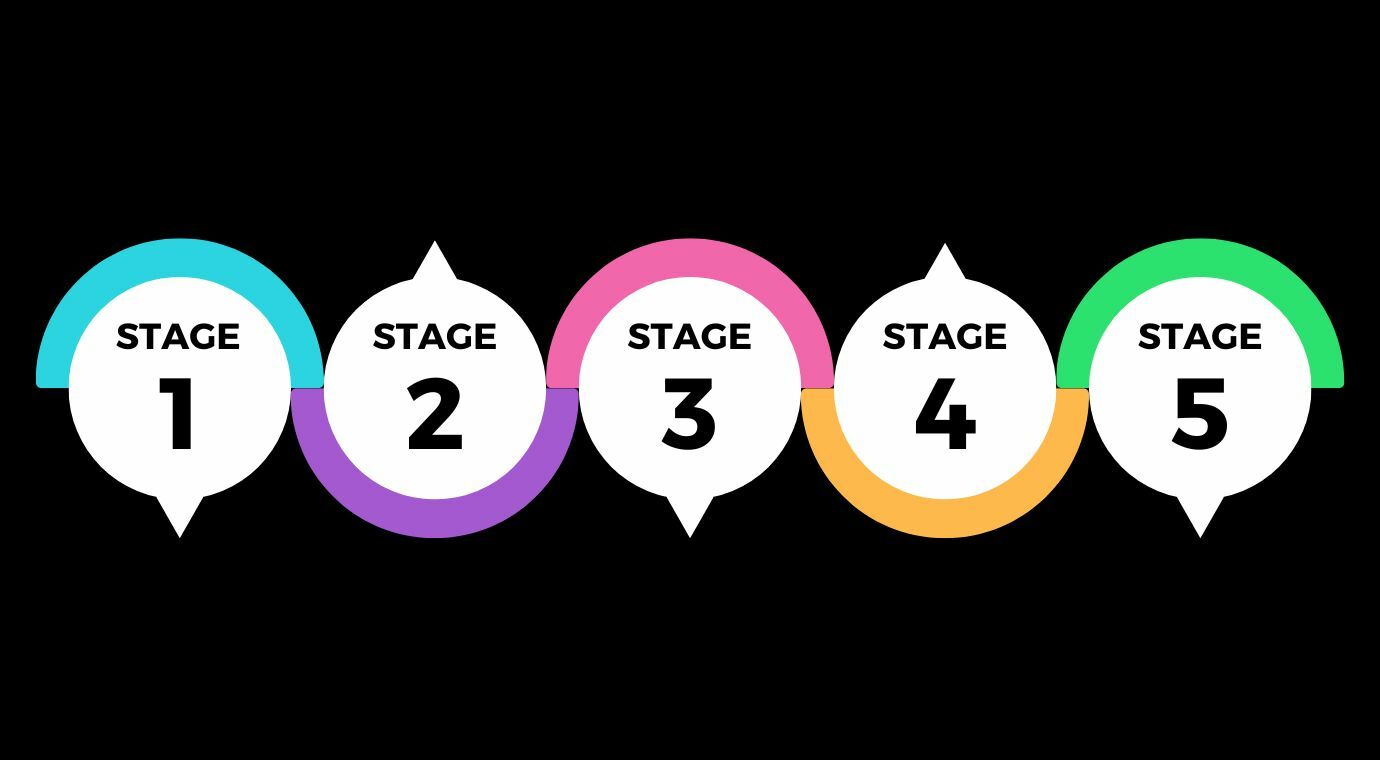
What Are the Stages of the No Contact Rule?
6 MIN READ
By Adam Smith - Coach, Entrepreneur


»
How Silence Transforms into Reconciliation: Decoding the Puzzling Stages of No Contact
»
You will learn:

The emotional journey an ex-partner undergoes during the no contact

The general timeline for the no contact to yield results and the factors that can influence this timeline
During the challenging post-breakup times, understanding the stages of the no contact rule can be your anchor: When you understand what's happening, your brain naturally reduces your stress levels. This article is about what your ex is going through, but I have a dedicated article about the stages of no contact for the person who was left.
In my coaching sessions, I've observed that many men and women believe their ex has become completely indifferent post-breakup. They feel as if their ex has moved on swiftly, sometimes seemingly overnight. Some even feel that their ex has suddenly become narcissistic or perhaps had been all along but concealed it well. While it's true that some exes might display narcissistic tendencies, it's essential to understand that this apparent indifference is most pronounced only in the early stages of no contact. During the later stages, the situation looks entirely different. So, let's dig into what's really going down with your ex during no contact:
In my coaching sessions, I've observed that many men and women believe their ex has become completely indifferent post-breakup. They feel as if their ex has moved on swiftly, sometimes seemingly overnight. Some even feel that their ex has suddenly become narcissistic or perhaps had been all along but concealed it well. While it's true that some exes might display narcissistic tendencies, it's essential to understand that this apparent indifference is most pronounced only in the early stages of no contact. During the later stages, the situation looks entirely different. So, let's dig into what's really going down with your ex during no contact:
Stage 1: The Breath of Freedom

While it might initially seem negative, please bear with me for a moment. This situation will actually prove detrimental for them, making them, in some ways, quite unlucky. The thing is, in the early stages of no contact, they often feel relief, sometimes even happiness. They're filled with anticipation for what they believe will be a fantastic new chapter in their lives. They see opportunities on the horizon and feel liberated from their past...Sometimes, they convince themselves that you were the source of their unhappiness (this is, of course, not true. Evil people do not read my blog. If you're reading this, there's a 99.92% chance you're empathetic and kind). They might even communicate this belief to you, and it's painful to hear. However, what will ultimately hurt them is the realization they'll confront later: they are the architects of their own unhappiness.
But now, they feel confident; they've achieved their objective. They had the strength and courage to end the relationship. It's worth noting that the person who initiates the breakup usually mentally prepares for it. Sometimes this preparation lasts months or even years before they decide to part ways. Right now, you both stand at opposite ends of the power spectrum: they're in a position of strength, while you feel vulnerable; they've moved on from the relationship, but you might still yearn for it.
And, if you're in no contact, they'll notice that you've ceased efforts to win back their affection. Still, they don't begin to worry immediately. Nevertheless, a renewed respect for you might start to develop...
But now, they feel confident; they've achieved their objective. They had the strength and courage to end the relationship. It's worth noting that the person who initiates the breakup usually mentally prepares for it. Sometimes this preparation lasts months or even years before they decide to part ways. Right now, you both stand at opposite ends of the power spectrum: they're in a position of strength, while you feel vulnerable; they've moved on from the relationship, but you might still yearn for it.
And, if you're in no contact, they'll notice that you've ceased efforts to win back their affection. Still, they don't begin to worry immediately. Nevertheless, a renewed respect for you might start to develop...
Stage 2: The Whispers of Doubt

They begin to feel a touch of sadness, though not necessarily because of you.
Perhaps a glass of wine or brandy is involved, or maybe a disagreement with a new 'friend' stirs up a hint of melancholy or nostalgia. This sparks a desire to check up on you, leading to them sending a message. We term this "a ping". They "ping" you to gauge your availability, wondering about your whereabouts and well-being. They reach out via text or a call to ensure you're still around. Just for assurance. On receiving confirmation of your presence and readiness to accept them, any feelings of nostalgia or reminiscent thoughts are quickly dismissed.
Whether or not to respond to pings is beyond the scope of this article. All I will advise is to carefully consider your response if they've committed serious transgressions - such as infidelity. But then, pursuing relationship recovery in itself is a contentious activity. Typically, with clients, we advise against responding to initial pings from an ex. At this stage, the no contact strategy begins to unfold its full potential. The balance of power starts to shift in your favor.
However, if you were to signal your ongoing availability and persistent thoughts of them, they would feel comforted knowing they can continue exploring new opportunities without the fear of losing you as an option. Should their current ventures prove unsuccessful, they can always return to you, who would presumably welcome them back after their explorations.
It's crucial to understand that if your ex doesn't "ping" you, it doesn't signify the ineffectiveness of the no contact rule. Some individuals might be more headstrong and resist the inclination to check up on you. The strategy of maintaining silence can still be effective in such instances. So, if your ex remains quiet - remain steadfast.
Perhaps a glass of wine or brandy is involved, or maybe a disagreement with a new 'friend' stirs up a hint of melancholy or nostalgia. This sparks a desire to check up on you, leading to them sending a message. We term this "a ping". They "ping" you to gauge your availability, wondering about your whereabouts and well-being. They reach out via text or a call to ensure you're still around. Just for assurance. On receiving confirmation of your presence and readiness to accept them, any feelings of nostalgia or reminiscent thoughts are quickly dismissed.
Whether or not to respond to pings is beyond the scope of this article. All I will advise is to carefully consider your response if they've committed serious transgressions - such as infidelity. But then, pursuing relationship recovery in itself is a contentious activity. Typically, with clients, we advise against responding to initial pings from an ex. At this stage, the no contact strategy begins to unfold its full potential. The balance of power starts to shift in your favor.
However, if you were to signal your ongoing availability and persistent thoughts of them, they would feel comforted knowing they can continue exploring new opportunities without the fear of losing you as an option. Should their current ventures prove unsuccessful, they can always return to you, who would presumably welcome them back after their explorations.
It's crucial to understand that if your ex doesn't "ping" you, it doesn't signify the ineffectiveness of the no contact rule. Some individuals might be more headstrong and resist the inclination to check up on you. The strategy of maintaining silence can still be effective in such instances. So, if your ex remains quiet - remain steadfast.
Stage 3: The Flames of Frustration

This phase typically begins a month or two later. Your ex may attempt to initiate additional contact to see if you're available. They might even surprise you with an angry message, citing something about your relationship or your character. It's common at this stage for them to express frustration and even anger. In my experience, only about 3-5% of individuals don't demonstrate their anger. They may feel it, but they're polite enough to keep it in check. If your ex remained civil during this period, it's a positive sign.
Remember: their anger isn't born out of hatred or a firm decision to separate from you. Instead, it arises from a feeling of losing their control over you. They can SENSE the shift in the power balance dynamic. At this stage, genuine worry begins to set in.
Remember: their anger isn't born out of hatred or a firm decision to separate from you. Instead, it arises from a feeling of losing their control over you. They can SENSE the shift in the power balance dynamic. At this stage, genuine worry begins to set in.
Stage 4: The Waves of Nostalgia

In the fourth stage, your ex begins to truly feel the sting of your absence for the first time since the breakup. Regardless of any negative episodes during the relationship, they will be hit with a wave of nostalgia and recall the good times.
In this stage, your ex starts to experience the same pain that you have been enduring. It is imperative to understand that our objective is not to be vindictive or to inflict pain, but rather, this emotional turmoil is an inevitable consequence of their choice to terminate the relationship. It's like they've been on a delayed timer, and only now the alarm bells are ringing, making them face the full magnitude of the consequences of their decisions. This is a sobering moment for them, as the weight of reality presses down.
This stage is characterized by your ex sending melancholic messages, but they're not yet prepared for reconciliation. We'll delve into how to determine if your ex displays a sincere wish to rekindle the relationship in the upcoming paragraph, where we address the final stage of the no contact:
In this stage, your ex starts to experience the same pain that you have been enduring. It is imperative to understand that our objective is not to be vindictive or to inflict pain, but rather, this emotional turmoil is an inevitable consequence of their choice to terminate the relationship. It's like they've been on a delayed timer, and only now the alarm bells are ringing, making them face the full magnitude of the consequences of their decisions. This is a sobering moment for them, as the weight of reality presses down.
This stage is characterized by your ex sending melancholic messages, but they're not yet prepared for reconciliation. We'll delve into how to determine if your ex displays a sincere wish to rekindle the relationship in the upcoming paragraph, where we address the final stage of the no contact:
Stage 5: The Echoes of Regret

Your ex begins to feel genuine regret and makes attempts to rekindle the relationship.
The most crucial aspect is: they should be the ones to initiate the reconciliation. It's their responsibility, not yours. And if your ex has reached this fifth stage and shows a clear intent to reconcile, they should be the ones to come to you for discussions.
However, if you stop your no contact prematurely, they may not achieve the necessary emotional state, and any apologies they offer may lack sincerity. This is where some of my clients falter. The most common mistake is to prematurely believe that your ex truly regrets their actions. You might even reconcile, but soon after, they lose interest quickly. This often happens because the strategy was discontinued too soon.
But how can you ascertain their sincerity? I recall my own emotions during my breakup. Essentially, any clue, any communication from my ex set off this chain of thought in my mind: okay, she wants to reunite, but is too shy or stubborn to take the first step... And if I don't initiate, she'll move on. Resisting the temptation to respond is tremendously challenging, particularly when you've been anticipating their message for months! Now, with over seven years of honing expertise in relationship psychology and five years spent solving complex cases and coaching individuals, I can confidently assert: if your ex genuinely wants to reconcile, they will persistently reach out until they get a response, even if their initial message is ignored. They will find a way to connect with you, no matter where you are. I personally know individuals whose exes literally showed up at their homes because they believed their messages were going unread. So, here's a straightforward method to determine if the inclination to reunite is authentic:
The most crucial aspect is: they should be the ones to initiate the reconciliation. It's their responsibility, not yours. And if your ex has reached this fifth stage and shows a clear intent to reconcile, they should be the ones to come to you for discussions.
However, if you stop your no contact prematurely, they may not achieve the necessary emotional state, and any apologies they offer may lack sincerity. This is where some of my clients falter. The most common mistake is to prematurely believe that your ex truly regrets their actions. You might even reconcile, but soon after, they lose interest quickly. This often happens because the strategy was discontinued too soon.
But how can you ascertain their sincerity? I recall my own emotions during my breakup. Essentially, any clue, any communication from my ex set off this chain of thought in my mind: okay, she wants to reunite, but is too shy or stubborn to take the first step... And if I don't initiate, she'll move on. Resisting the temptation to respond is tremendously challenging, particularly when you've been anticipating their message for months! Now, with over seven years of honing expertise in relationship psychology and five years spent solving complex cases and coaching individuals, I can confidently assert: if your ex genuinely wants to reconcile, they will persistently reach out until they get a response, even if their initial message is ignored. They will find a way to connect with you, no matter where you are. I personally know individuals whose exes literally showed up at their homes because they believed their messages were going unread. So, here's a straightforward method to determine if the inclination to reunite is authentic:

Instead of a single message, there's a sequence of messages.

The messages explicitly express a desire for reconciliation; they're not merely hinting at it.

The messages are conveyed from a position of vulnerability rather than a position of power. For example, "I made a mistake, I love you, can we talk?" as opposed to "I've decided we need to be together, come over to discuss it," or "Hey, why don't you drop by and we forget all about what happened?" or even "We both messed up, can I come talk?"
How long will it take for no contact to get results?

I've had clients who witnessed results in merely 1 or 2 months. On average, the entire process unfolds over a span of 3 to 4 months. However, if your ex is in a rebound relationship, the fourth stage - experiencing the weight of your absence - may be postponed. This stage typically commences once their new relationship has concluded, which, statistically speaking, tends to occur around 9 to 10 months. I recognize that this information might be difficult to digest, but I firmly believe you deserve to know the reality. Additionally, various factors like your objective value can speed up the process.
In my practice with clients, I often provide predictions for when they can anticipate the next contact from their ex. To provide accurate insights, I need a thorough understanding of your specific situation, including details about your ex-partner's personality and various other factors. Can you undertake this by yourself? Absolutely. The primary goal of my online presence is to enhance your knowledge, enabling you to gain essential insights more swiftly than I did during my own breakup ordeal, which lasted over two years.
In my practice with clients, I often provide predictions for when they can anticipate the next contact from their ex. To provide accurate insights, I need a thorough understanding of your specific situation, including details about your ex-partner's personality and various other factors. Can you undertake this by yourself? Absolutely. The primary goal of my online presence is to enhance your knowledge, enabling you to gain essential insights more swiftly than I did during my own breakup ordeal, which lasted over two years.
»
Key Points
»

Understanding the concept of no contact involves grasping the shift in power balance within a relationship

During the no contact period, the ex-partner usually experiences a journey through five stages - Relief, Worry, Anger, Worry/Nostalgia, and Regret. These stages reflect their reactions to the shifting power dynamics. It is important to note that these "stages" are mere simplifications of the underlying psychology.

It is crucial to stay consistent with the no contact strategy and not rush the process. Responding prematurely could hinder the ex-partner from reaching the emotional state of regret and can potentially interrupt the recovery process.
»

Not knowing this astonishing secret practically guarantees the negative experience during no contact:
DISCOVER THIS RECOVERY-ACCELERATING SECRET
MOST POPULAR DOWNLOAD
Not feeling any better
Having relentless thoughts of an ex
Battling those near-impossible-to-resist urges to reach out





